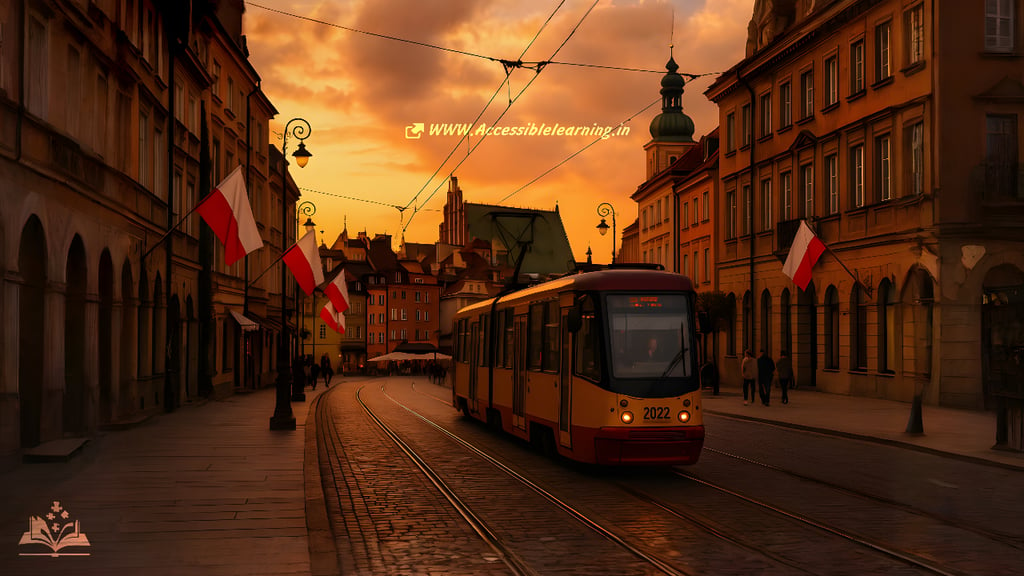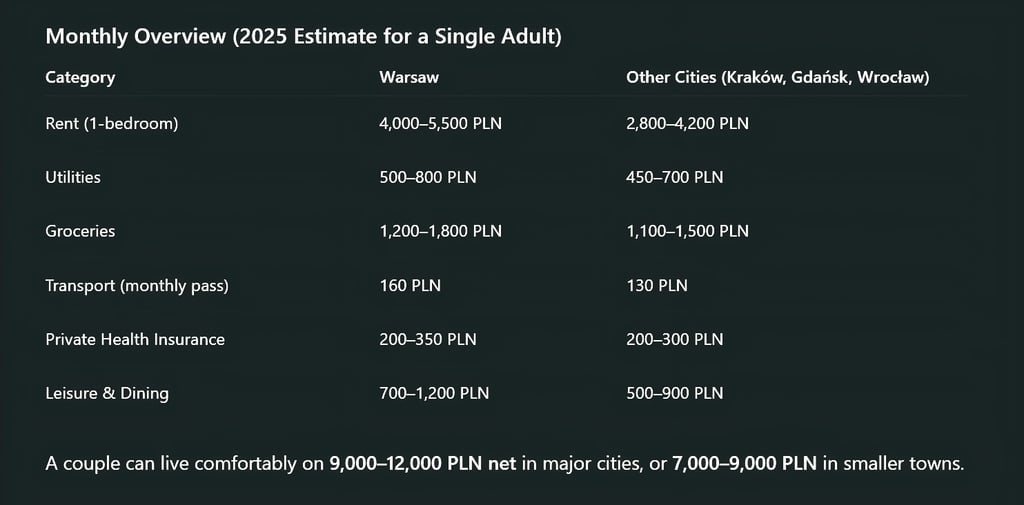
Living Permanently in Poland: The Real Life Beyond the Visa and the Dream
Discover what it truly means to live permanently in Poland—from navigating bureaucracy and cultural depth to building long-term belonging among Polish people. This in-depth guide reveals the realities of work, housing, healthcare, language, and emotional adaptation after 12 years of life in one of Europe’s most resilient nations.
AWARE/VIGILANTNEPOTISM/SOCIAL ISSUESTRAVEL LIFEPOLAND
Kim Shin
10/30/20259 min read


Living permanently in Poland is a journey of transformation—from an observer to a participant in a society that values depth, loyalty, and structure. It’s not the “cheap European alternative” narrative you see online—it’s a country of discipline and tradition, progress and patience, where your success depends less on luck and more on how much you align with the Polish rhythm of life.
After over 12 years among Polish people, the picture that emerges is layered: steady economic growth, predictable systems, and social subtlety. Yet beneath that order lies a society deeply rooted in history, memory, and quiet pride. To thrive here means learning not just the rules, but the rhythm.
The Cultural Landscape: Reserved, Loyal, Deeply Grounded
A Society Built on Continuity
Poland is a nation that rebuilt itself multiple times from ashes. That historical resilience shapes everyday attitudes: caution before trust, effort before entitlement, and loyalty after proof.
People rarely show emotion in the first meeting, but once they open up, relationships last for decades. A “yes” means yes, but only when it’s backed by time, proof, and character.
Tradition & Modernization
In Poland, Catholicism, patriotism, and community coexist with innovation and tech ambition.
Warsaw and Wrocław pulse with startups and global companies, yet smaller cities still follow Sunday rhythms of rest, church, and family. This coexistence defines Poland’s charm—it’s both old Europe and new Europe.
Personal Expression
Poles value honesty and humility. You’ll gain respect not through extravagance but through competence and constancy. Show that you work hard, deliver what you promise, and keep your word—that’s how one integrates in this culture.
Bureaucracy: A System That Teaches Patience and Precision
The Paper Trail Reality
The bureaucracy is not designed to frustrate you—it’s designed to ensure order and traceability. Every decision is documented, every form double-checked, and every process structured through the proper channels.
Expect to encounter:
Certified translations, apostilles, and notarized copies.
Online portals (like ePUAP) that work well once set up—but require Polish login systems.
Strict appointment systems at Voivodeship offices (Urząd Wojewódzki).
It’s demanding but predictable once understood.
Long-Term Residency Pathways
For EU citizens, the process is straightforward after registration.
For non-EU citizens, expect:
Temporary residence permit (Karta Pobytu czasowego)—1 to 3 years.
Permanent residence (Karta Pobytu stałego)—after 5 years of legal stay.
Long-term EU residence permit—similar duration but allows mobility within the EU.
Poland rewards consistency—uninterrupted legal status, stable income, and registered housing make the difference between temporary and permanent acceptance.
The Economic Landscape: A Quiet European Powerhouse
Poland’s Economic Evolution
Over the past two decades, Poland transitioned from post-communist recovery to one of Europe’s most resilient economies.
It thrives on a mix of:
Manufacturing and logistics hubs (Katowice, Łódź, Poznań)
Finance and shared service centers (SSC/BPO) in Kraków and Wrocław
Technology and creative industries in Warsaw, Gdańsk, and Poznań
Wages have risen steadily, yet remain competitive compared to Western Europe, attracting international professionals who seek balance between cost and opportunity.
The Reality of Work
While English-speaking roles exist, Polish fluency multiplies your opportunities.
Workplaces value punctuality, direct communication, and hierarchy awareness. The tone is formal but fair. Once you prove reliability, trust builds quickly.
Remote work has also become a norm in the IT, design, and content sectors—allowing flexibility while staying legally anchored in Poland.
Cost of Living: Where Value Meets Stability
Poland is not a “budget country,” but it offers one of Europe’s best value-for-quality ratios.



Housing Realities: Between Stability and Competition
The housing market reflects the Polish approach to order—structured, documented, and fast-moving.
Renting
Most leases require a 1–2 month deposit.
Registration (zameldowanie) at the property is crucial for legal residence paperwork.
New apartments are well-built but in high demand.
Older flats offer charm but require attention to heating and windows.
Buying
Mortgage availability is good for residents with steady income, though paperwork is thorough.
Expect to provide:
Tax records
Employment contracts
Residency card copies
Foreigners can buy property freely (except for some agricultural land). Prices continue to rise steadily—Warsaw and Kraków lead the curve.
Healthcare & Daily Security
Healthcare System
Poland’s healthcare system operates under NFZ (National Health Fund), offering free access to general care once registered. However, waiting times for specialists can stretch weeks or months — hence most locals and expats maintain private health packages for 24/7 access.
Private hospitals in Warsaw, Gdańsk, and Kraków are well-equipped and often staffed by bilingual doctors.
Pharmacies (Apteka) are abundant, and e-prescriptions are common with a PESEL number.
Safety and Daily Life
Poland is one of Europe’s safest countries. Public transport is efficient, neighborhoods are calm, and street crime is rare. Nightlife, especially in university cities, is vibrant yet generally safe. Women often walk alone at night in central areas without concern—a testament to Poland’s community vigilance and social discipline.
Education, Family, & Society
Education
Polish education emphasizes discipline and knowledge depth. Public schools are strong in STEM and literature; private and international schools cater to expat families, offering bilingual or IB programs.
Universities like the University of Warsaw, Jagiellonian University, and Warsaw School of Economics (SGH) are respected worldwide, attracting both EU and global students.
Family & Parenting Culture
Polish society values family unity deeply. Parents often involve grandparents in child-rearing, and family meals are sacred moments. Sundays remain a day of rest and connection. Public childcare options are limited but affordable; private nurseries offer flexibility. For those planning long-term settlement, Poland offers a safe, structured environment for raising children.
Language and Belonging: The Polish Paradox
Living 12 years in Poland teaches you one truth—the key to real belonging is language.
Poles respect effort, even broken grammar. Speaking Polish opens the gates to humor, trust, and emotional nuance. Without it, you remain a courteous outsider.
Learning Polish is challenging—its grammar is famously complex—but its logic and rhythm reflect the Polish mindset: precise, structured, and expressive.
Once you start understanding conversations in shops or jokes over dinner, the city stops feeling foreign. It becomes yours.
Social Integration: The Invisible Curriculum
To integrate into Polish society, you must understand not only the language but also social codes—quiet gestures of respect and restraint that define daily life.
Key Principles
Consistency: Polish people respect steady character, not flamboyant charm.
Modesty: Avoid boasting; let actions speak.
Respect for elders: Greet seniors first, offer seats in public transport, and listen before you speak.
Participation: Join local events—from Christmas markets to independence parades—to feel the country’s heartbeat.
Silence is communication: In Poland, comfortable silence signals respect, not distance.
Integration is a slow process—often taking 4–5 years—but once accepted, you’ll feel an unspoken loyalty and trust that few countries offer.
The Emotional Evolution: From Foreigner to Insider
The transformation from living in Poland to living as part of Poland is emotional and internal.
The first few years often bring:
Frustration with paperwork and language
Loneliness from cultural restraint
Admiration for order and safety
But over time, you’ll discover:
A deep respect for time-tested traditions
Humor that is dry but honest
Friendships that, once formed, feel unbreakable
Poland doesn’t flatter newcomers—it tests them. But those who stay, learn, and adapt earn something rare in our restless age: a stable life anchored in trust and meaning.
The Balance of Modern Poland: Between Memory and Momentum
Today’s Poland stands at a cultural and economic crossroads—proud of its past, ambitious about its future.
Cities like Warsaw, Gdańsk, Kraków, and Wrocław blend historical architecture with digital dynamism.
Meanwhile, the countryside preserves the slow pulse of tradition, harvests, and hearths.
Poland’s true wealth lies in this balance of modern precision and old-world heart—where digital entrepreneurs still make time for family pierogi dinners, and church bells coexist with coding bootcamps.
To live permanently in Poland is not just to reside—it’s to synchronize with this duality.
Living in Poland permanently means embracing structure, history, and community as inseparable companions. It means learning to love winters, bureaucracy, and silent smiles—because within them lies the discipline of belonging.
You don’t just “move to Poland.” You earn your place—day by day, through effort, language, and patience.
And when you do, you’ll find that Poland—once distant and formal—becomes not only your home but your mirror: resilient, loyal, and quietly proud.

Interesting Little Truths About Life in Poland
Living permanently in Poland isn’t just about paperwork, jobs, or weather—it’s about subtle rhythms, small rituals, and quiet gestures that reveal how people really live. Here are some truths only long-term residents come to understand:
Name Days Matter More Than Birthdays
In Poland, celebrating your imieniny (Name Day) can be more significant than your birthday. People remember each other’s Name Days, bring flowers or sweets, and wish you joy. Forgetting it is like missing a personal holiday.
Mushroom Season Is Sacred
When autumn comes, entire families head into forests with baskets. Mushroom foraging (grzybobranie) is both a tradition and a national sport—and everyone believes their spot is a secret worth guarding.
Shoes Off, Always
Entering a Polish home? Take off your shoes—instantly. Hosts will often hand you slippers (kapcie). It’s both respect and hygiene—an unspoken national rule.
Queues Are a Moral Contract
Whether at a bakery or post office, queues are sacred. Cutting the line isn’t just rude; it’s a social sin. Respecting order earns silent approval.
Home Baking Is an Art Form
If invited for tea, expect homemade cake. Poles bake with pride—cheesecake (sernik), poppy seed rolls (makowiec), or apple pie (szarlotka). Declining a slice twice is almost impossible.
Silence Isn’t Awkward
In Polish culture, silence often signals comfort or thoughtfulness, not coldness. You can share a quiet coffee and still be fully present in the moment—no filler words required.
Winters Create Communities
While cold months may seem isolating, they actually bring people closer. Winter dinners, hot wine in markets, shared sauna trips, and candlelit evenings make warmth a collective experience.
Language Is the True Key
A few heartfelt Polish phrases—even imperfect ones—can open doors faster than any document.
A simple “Dzień dobry” (Good day) or “Dziękuję bardzo” (Thank you very much) carries real cultural respect.
Sunday Means Stillness
By law and by heart, Sunday is quiet. Most shops close, streets calm, and families gather for lunch. The silence feels almost sacred—a pause modern life often forgets.
Polish Hospitality Is Earned, Not Offered
The warmth of Polish friendship takes time to access—but once you do, it’s deep, reliable, and unwavering. Poles don’t open their doors easily, but when they do, they keep them open forever.
Frequently Asked Questions
Q: How difficult is it to learn Polish?
Polish grammar is complex, but its logic is consistent. The first six months are the hardest—once you grasp cases and pronunciation, progress accelerates. Most locals deeply respect foreigners who try, even imperfectly. Dedication matters more than perfection.
Q: Can I live in Poland permanently without speaking Polish?
In large cities like Warsaw, Kraków, or Wrocław, yes—but you’ll always remain on the edges socially.
To build real friendships, manage bureaucracy smoothly, and feel at home, Polish is not optional—it’s transformative.
Q: Is healthcare in Poland reliable?
Yes. Public healthcare (NFZ) covers essential needs and emergencies for registered residents.
Most long-term residents combine it with private insurance for faster specialist appointments and English-speaking doctors.
Q: How long do I need to live in Poland before applying for permanent residency?
Generally, five years of continuous legal residence with a stable income and valid address is required.
For family-based or humanitarian visas, the timeline can be shorter. Keep all residence and tax documents carefully—they’ll be crucial during the application.
Q: Is Poland safe for foreigners and families?
Absolutely. Poland is one of Europe’s safest countries. Street crime is rare, public transport is secure, and late-night walks are common in most cities. Social stability and community vigilance make daily life peaceful and predictable.
Q: What are the best cities for foreigners to live in long-term?
Warsaw—for business, tech, and global connections.
Kraków—for culture, academia, and creative industries.
Wrocław—for a youthful, international atmosphere.
Gdańsk—for coastal beauty and a balanced lifestyle.
Smaller towns like Poznań or Lublin offer affordability and a calmer pace.
Q: What are the living costs for a comfortable life in Poland?
Expect around 7,000–10,000 PLN net per month for a comfortable single life in a major city, including rent, food, healthcare, and leisure. Couples can live comfortably on 9,000–12,000 PLN, depending on lifestyle choices.
Q: How is the weather year-round?
Poland has four distinct seasons:
Spring: fresh, green, full of optimism.
Summer: sunny, warm, outdoor festivals.
Autumn: golden, cool, poetic—mushroom season.
Winter: cold but cozy—snow, candles, and tea.
Winters can feel long, but indoor life compensates beautifully with rich culture and community.
Q: Is there a large expat community in Poland?
Yes. Major cities have thriving expat groups, language exchange meetups, cultural clubs, and professional networks. Still, the true integration happens when you go beyond expat circles and start mixing with locals.
Q: What makes people stay in Poland permanently?
Safety, structure, and sincerity. Poland doesn’t promise instant comfort—it offers earned stability and meaningful human connections. Those who stay long-term usually say the same thing:
“It’s not an easy country to love quickly, but it’s impossible not to love deeply once you belong.”
Subscribe To Our Newsletter
All © Copyright reserved by Accessible-Learning Hub
| Terms & Conditions
Knowledge is power. Learn with Us. 📚


